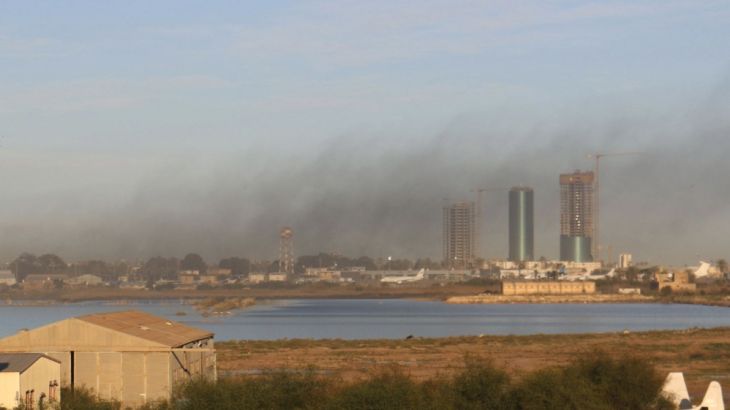Government in Tobruk to halt air strikes for three days
Hours after Tripoli bombings, UN-backed administration says it will stop attacks for 72 hours to aid Rabat peace talks.

Libya’s UN-recognised government, based in the eastern city of Tobruk, has said it will halt air strikes for three days in an attempt to promote peace talks taking place in Morocco, a day after the airport in the capital Tripoli was bombed.
“It is seen as a step forward by all parties,” said Al Jazeera’s Hashem Ahelbarra, reporting from Rabat on Friday, where UN-brokered peace talks aimed at resolving the political turmoil in Libya had started a day earlier.
Keep reading
list of 4 itemsWhy is Germany maintaining economic ties with China?
UN’s Libya envoy resigns citing no hope for political progress
UN urges restraint as Iran and Israel trade barbs at Security Council
Ahelbarra said that the rival Tripoli-based government had cautiously welcomed the announcement and said its legislators had been given a mandate to push strongly for a peace deal during the talks.
Muhammad Abdulaziz, a member of the Tobruk government delegation, said: “There is no way but to pursue a very productive national dialogue that could reach the state of having a total agreement on both parties.”
Also speaking in the Moroccan capital, Bernardino Leon, the UN special representative for Libya, said: “It makes no sense to go back to fighting and confrontation. This would lead nowhere.”
The UN is brokering the Morocco talks among the various factions and the two governments, with two other sessions planned in Algeria and Brussels next week.
Separate meetings
The Tobruk-based government had dispatched fighter planes on Thursday to carry out the air strikes on the airport in Tripoli, where the General National Congress, a rival legally-installed government, holds power.
The jets hit an open area near the runway at Maitiga airport but caused no major damage and the airport was operating normally, a security source at the airport told the Reuters news agency.
Tensions between the two administrations has fuelled rival militias and allowed fighters claiming association with the Islamic State of Iraq and the Levant (ISIL) group to gain control of the cities of Sirte and Darna.
Western officials see the UN talks in Morocco as the only hope of forming a unity government and halting the fighting. But previous talks have yielded little.
“There is a sense, of, if it’s not optimism, at least a sense that it is possible to make a deal, and that is something very important because in the last months, this was not the case,” Leon told reporters after the first session.
Delegates at the talks in the coastal town of Skhirate near Rabat met separately with the UN mediators. The talks agenda includes a unity government and security.
The talks began a day after Libya’s state-run National Oil declared itself inoperable at 11 oil fields after a series of attacks by rebels purportedly linked to ISIL.
Force majeure – a legal step shielding the company from liability if it cannot fulfil contracts for reasons beyond its control – was announced on Wednesday shortly after gunmen attacked the Dahra oil field near Libya’s central coast.
The attack on the oil field prompted a counterattack by government forces that included air strikes, said Mashallah al-Zewi, oil minister of the country’s Tripoli-based government.